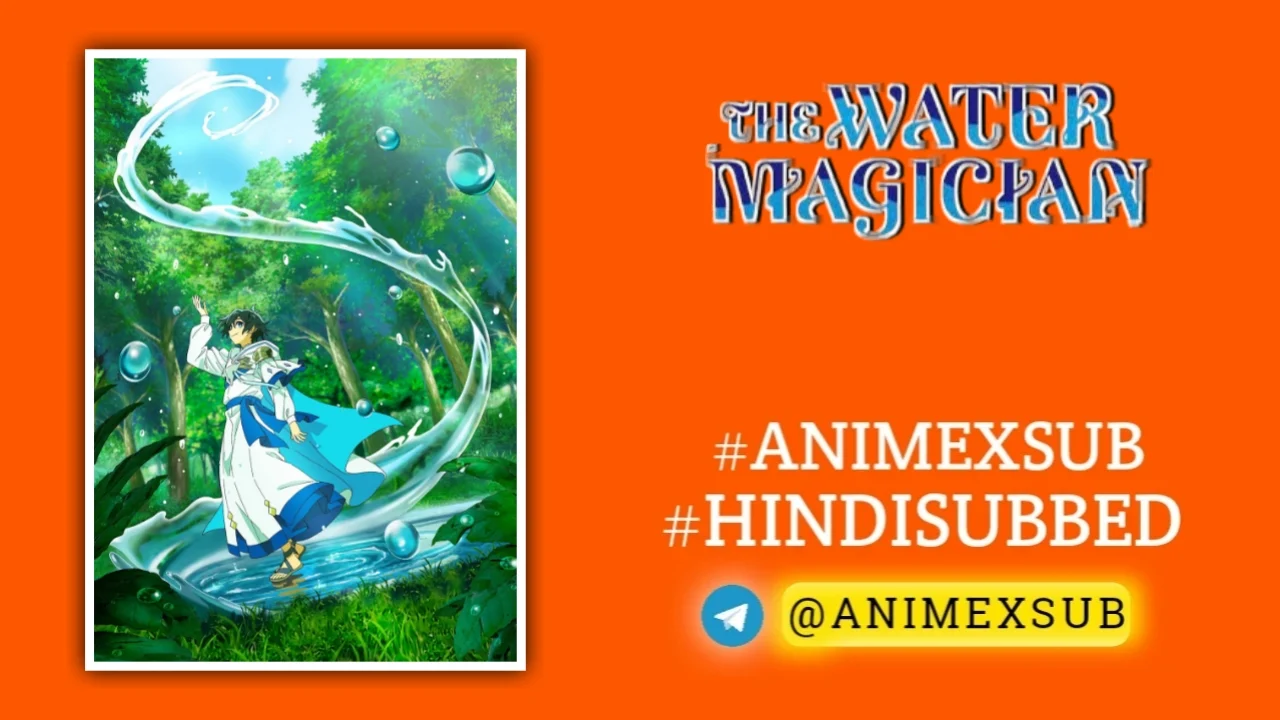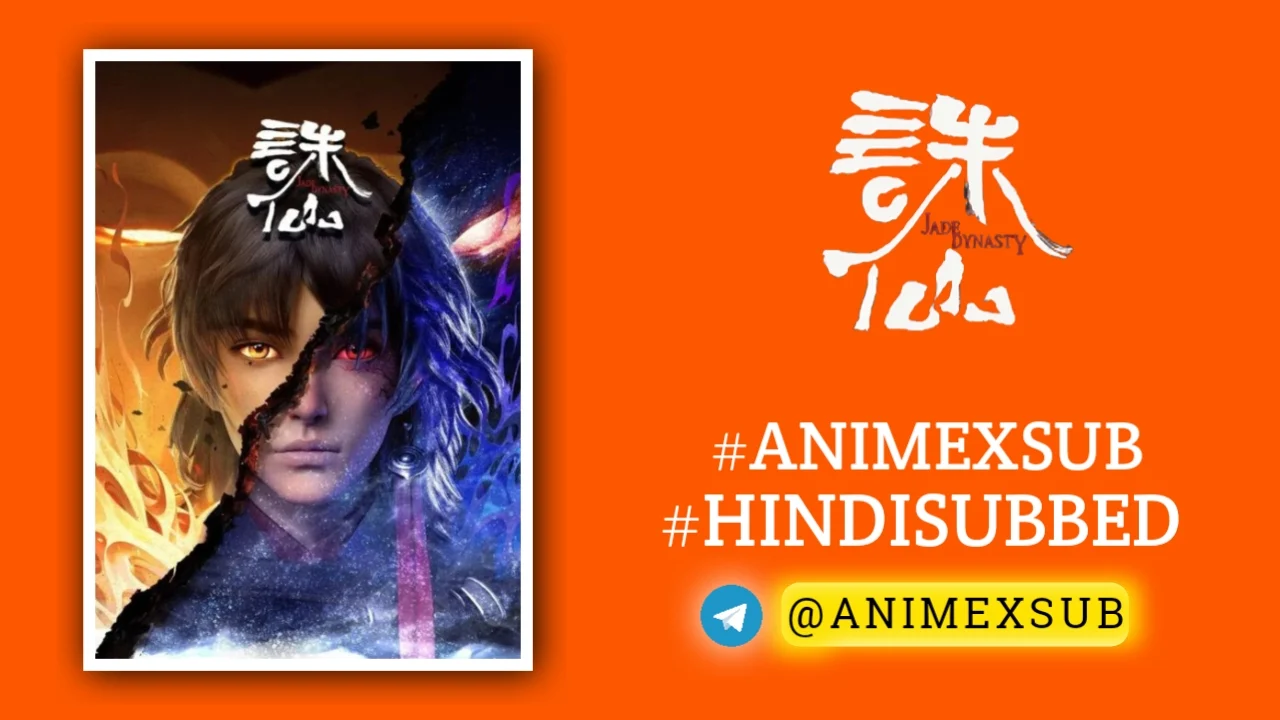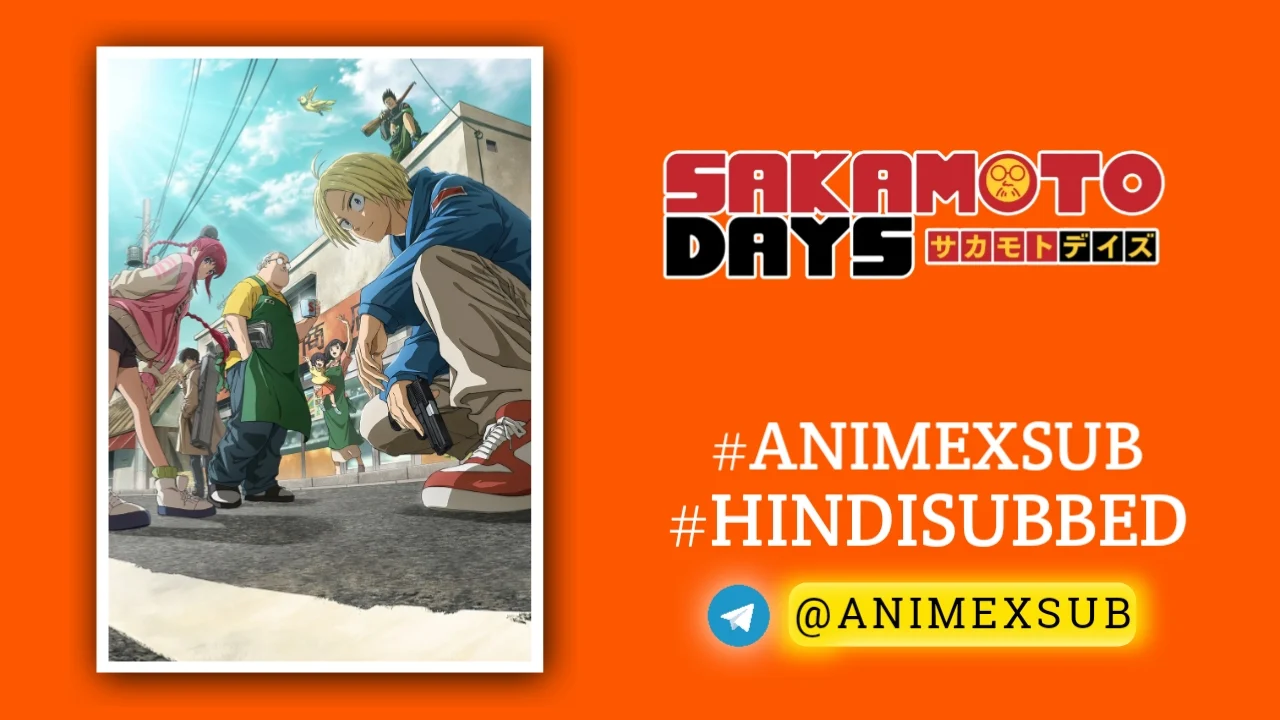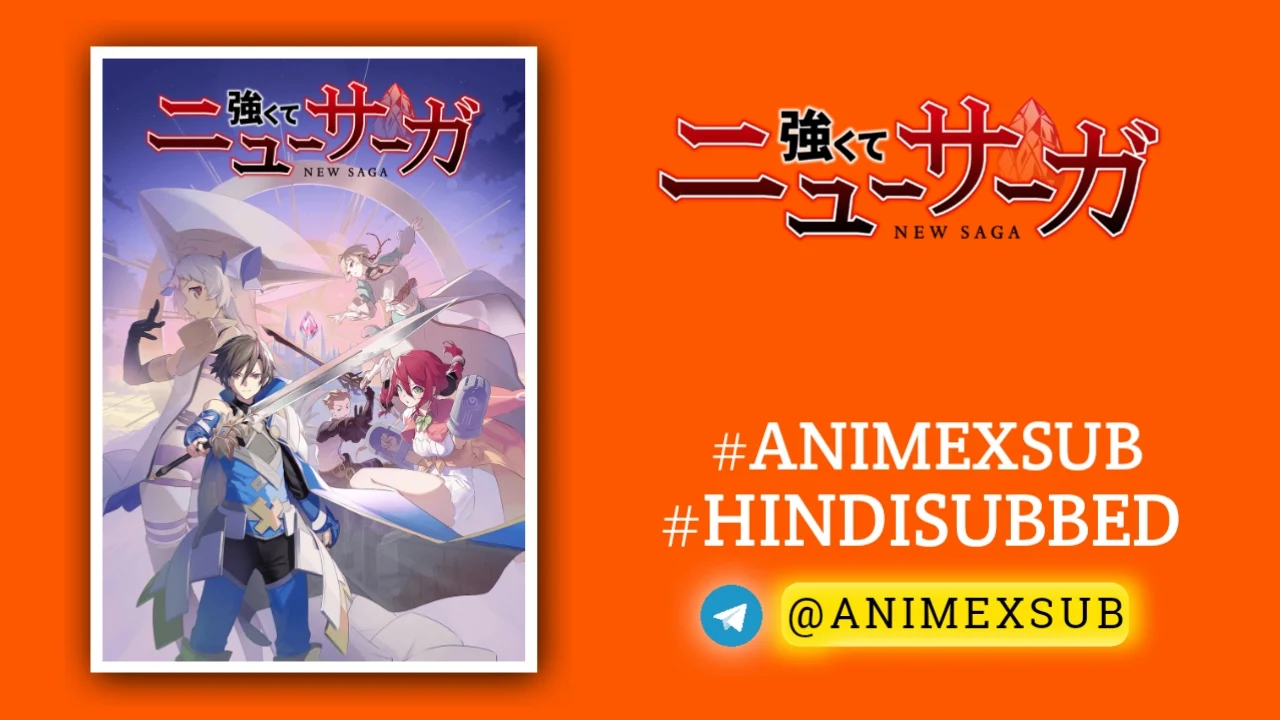
The Water Magician Hindi Subbed [10/12] | Mizu Zokusei no Mahou Tsukai Hindi Sub

Mizu Zokusei no Mahou Tsukai
The Water MagicianSynopsis
Ryou is delighted to be reincarnated into the fantastical world of Phi, where he thinks he’ll get to live a quiet life learning to use his newfound water magic. Going with the flow here, however, means something very different. Ryou is immediately pitted against the wild lands he winds up in and the slew of deadly monsters that call the remote subcontinent home. You’d think he’d forget about taking it easy when he’s stuck fighting for his life, but lucky for Ryou, he’s naturally optimistic, clever, and blessed with the hidden “Eternal Youth” trait. Twenty years pass in the blink of an eye, and each encounter along the way pushes him one step closer to the pinnacle of human magic. Little does he realize that’s only the opening chapter of his tale. A fateful meeting soon thrusts Ryou to the forefront of history, forever changing the course of his life... Thus begins the adventures of the strongest water magician the world has ever seen—who also likes to do things at his own pace! (Source: J-Novel Club)
Watch Trailer
Characters
Episodes
How To Download Tutorial
The Water Magician Season 1: A Submerged Isekai Odyssey
In the ever-expanding sea of isekai anime, where protagonists are routinely yanked from mundane lives into realms of infinite potential, The Water Magician Season 1 emerges as a deceptively tranquil current. Premiering in July 2025 on Crunchyroll, this 12-episode adaptation of Tadashi Kubō’s light novel series—illustrated by Hana Amano—charts a course that prioritizes introspective growth over explosive confrontations. Directed by Hideyuki Satake, with series composition by Jun Kumagai and character designs by Haruka Otsuzumi, the show is produced by Typhoon Graphics and Wonderland. At its core, it’s the story of Ryo Mihara, a 20-year-old Japanese everyman who meets an untimely end via the classic “truck-kun” trope, only to awaken in the fantastical world of Phi as a fledgling water magician blessed (or cursed) with eternal youth. What follows is a narrative that unfolds like a slow-rippling pond, revealing depths of world-building and magical innovation amid a surface-level calm that has divided audiences.
Plot Breakdown: From Solitary Waves to Societal Tides
Season 1 adapts the first arc of the light novels, compressing Ryo’s initial 20 years of isolation into a digestible framework while building toward his reluctant integration into Phi’s broader society. The premiere episode sets the tone masterfully: Ryo, voiced with understated optimism by Ayumu Murase, materializes in a remote forest armed with basic supplies from a guardian angel and a enchanted water sword bestowed by a enigmatic headless king. His goal? A “slow life” of self-sufficiency, hunting monsters for sustenance and experimenting with his limited water magic—starting with conjuring mere cupfuls to hydrate plants or purify streams. Unbeknownst to him, his eternal youth trait warps time’s passage; what feels like months of trial-and-error training spans decades, allowing him to evolve from novice to a subtly overpowered force without the visual toll of aging.
Early episodes (1-4) immerse viewers in this survivalist slice-of-life phase. Ryo’s ingenuity shines as he innovates spells: transforming water into barriers, projectiles, or even makeshift tools for foraging. A standout sequence involves him taming an evolved Assassin Hawk, blending practical problem-solving with fluid combat animation that highlights water’s versatility—freezing foes in mid-air or redirecting streams to outmaneuver larger beasts like warthog-like Pumbaa variants or massive Corviknight-inspired birds. These encounters introduce Phi’s ecosystem, where magic attributes (water, fire, earth, wind) dictate survival hierarchies, and monsters evolve based on environmental pressures, adding a layer of ecological realism rarely explored in isekai.
The midpoint (episodes 5-8) introduces ripples of external conflict. Ryo’s path crosses with Abel, a telepathic dragon voiced by Yoshitada Tsuka, and a castaway swordsman, pulling him toward civilization. Here, the story shifts from solitary reflection to subtle intrigue: Ryo joins a guild in a frontier town, where his unassuming demeanor masks his prowess. Subplots delve into Phi’s political undercurrents—rival magicians hoarding resources, guild politics favoring fire-based combatants, and whispers of a looming monster migration tied to disrupted water cycles. A dungeon delve in episode 4 pits Ryo against a challenging rival, Leonore Urraca Alburequerque (voiced by Makoto Koichi), whose earth magic forces him to adapt water spells creatively, like creating pressurized geysers to erode barriers. This arc culminates in episode 6’s town adventure, where Ryo thwarts a kidnapping plot involving a bully named Dan, blending everyday guild life with hints of larger threats, such as a vengeful water goddess subplot that emerges abruptly but ties into Phi’s lore of elemental deities.
The finale (episodes 9-12) accelerates into Ryo’s spotlight moment. Thrust into a high-stakes monster incursion threatening the capital, he collaborates with Abel and a ensemble of supporting characters—an elf archer with subtle depth and a knightly order skeptical of “lesser” water mages. The climax reimagines water magic’s potential: Ryo orchestrates a massive tidal surge to redirect a horde, not through brute force but precise environmental manipulation, echoing real-world hydrology principles like erosion and flow dynamics. Yet, true to its theme, the resolution reaffirms Ryo’s desire for peace, ending on a contemplative note as he ponders the cost of his eternal isolation amid newfound alliances. This structure avoids the genre’s typical escalation traps, instead using time skips and Ryo’s unchanging youth to explore themes of stagnation versus progress.
Animation and Technical Mastery: Fluid Brilliance Amid Static Shores
Visually, The Water Magician punches above its weight, particularly in animating its titular element. Liquid simulation is notoriously demanding—requiring intricate particle effects for realistic flow, refraction, and interaction—but the studios deliver breathtaking sequences. Ryo’s spells ripple with lifelike translucency: droplets scatter like prisms in sunlight, waves crash with viscous weight, and frozen constructs glint with subtle cracks. The premiere’s water bubble demonstration sets a high bar, contrasting sharply with later episodes’ more static backgrounds, which some critics noted as budget-constrained. Monster designs evolve from crude manga CG origins to hand-drawn fluidity, with beasts like the hawk exhibiting dynamic feather ruffles and predatory glides.
Character animation, however, reveals inconsistencies. Ryo’s perpetual youth manifests in smooth, boyish expressions that convey quiet determination but border on blandness, amplifying complaints of his “boring” persona. Supporting cast movements feel rushed in group scenes, with limited facial nuance for ensemble members like the elf or Abel’s dragon form. The OST, composed to evoke a “cozy vibe,” complements this with gentle harps and flowing synths during training montages, though action cues occasionally overwhelm with generic orchestral swells. At 7.0/10 on IMDb and mixed MyAnimeList scores, the technical execution earns praise for innovation—water as a “challenging” medium is elevated to a visual hook—but falters in sustaining momentum across the season.
Strengths: Innovative Magic and Thematic Depth
What elevates The Water Magician beyond standard isekai fare is its subversion of power fantasies. Ryo isn’t a harem-collecting demigod; he’s an optimist engineering a hermit’s existence, using magic practically—irrigating crops or purifying water—rather than for spectacle. This grounds the world-building: Phi’s magic system incorporates scientific undertones, where water’s properties (density, conductivity) influence spell efficacy, allowing for creative problem-solving like electrocuting foes via moistened grounds or healing via purified elixirs. The eternal youth mechanic adds philosophical weight, mirroring Frieren: Beyond Journey’s End in its meditation on time’s passage, but uniquely through Ryo’s obliviousness—he trains relentlessly without aging, emerging as a “legend at his own pace.”
Supporting elements enrich this: Abel’s telepathic bond fosters quiet camaraderie, while guild dynamics expose societal biases against water mages, critiquing how rarity undervalues utility. The slow-burn pacing, though divisive, builds immersion, rewarding patient viewers with payoffs like the dungeon rivalries that showcase Ryo’s growth from reactive survivalist to strategic innovator.
Weaknesses: Pacing Eddies and Character Currents
Critics and fans alike point to the deliberate tempo as a double-edged sword. Early episodes drag with repetitive training loops—Ryo experimenting endlessly without clear stakes—leading to yawns and drop-offs, as one Reddit user lamented the lack of “seasons changing” to mark time. Ryo’s blandness exacerbates this; his self-insert appeal feels underdeveloped, lacking the emotional hooks of protagonists like Chise from The Ancient Magus’ Bride. Subplots, such as the water goddess tease, insert awkwardly, feeling like forced lore dumps rather than organic reveals.
Animation dips post-premiere, with cut-rate transitions and underanimated crowds, underscoring budget limitations. Ensemble characters often serve as plot devices—Abel’s wisdom or Leonore’s antagonism—without deep arcs, making interactions feel formulaic. For a genre bloated with hype, the show’s “overhyped” reputation stems from misleading promos promising more action, leaving some viewers with a 5/10 “mid” verdict.
Critical and Fan Reception: A Divided Stream
Season 1 garnered polarized responses. Anime Feminist called it a “cozy but boring” self-insert, praising water visuals but questioning Ryo’s followability. 12 Reddit threads echoed this, with episode discussions highlighting the “chill vibe” and OST but decrying rushed time progression and lack of hooks. 15 On X, sentiments ranged from “animation is admittedly pretty cool” for brain-off viewing to frustrations with “slow and tedious” pacing that builds anticipation without delivery. 1 IMDb’s 7.0 aggregate reflects this: fans lauded its refreshing OP protagonist who shuns conflict, while detractors found supporting casts “annoying” and the narrative forgettable. 14 ScreenRant highlighted its “breath-taking” debut as a laid-back counterpoint to summer’s action-heavy slate, though noting adaptation compressions that disrupt flow. 30
Anime News Network’s preview guide dismissed it as a “melatonin-codeine cocktail” for its somnolence, yet acknowledged the light novel’s self-sufficiency allure akin to My Side of the Mountain. 28 Overall, it’s seen as a niche gem for magic-system enthusiasts, scoring 6-7/10 averages, but struggling against 2025’s crowded isekai wave.
Lasting Ripples: Why It Matters in Isekai Evolution
The Water Magician Season 1 doesn’t reinvent the genre but refines it, proving that power needn’t equate to chaos. By centering water’s humble adaptability—life-sustaining yet lethally precise—it offers a meditative counter-narrative to bombastic peers, inviting reflection on isolation’s quiet toll. For all its eddies of pacing and character flatness, the season’s fluid innovations and ecological magic make it a worthwhile dip, especially for those weary of endless battles. As Ryo flows onward, it leaves one pondering: in a world of endless reincarnation, is true strength found in stillness?1










Kks
??
Bekar site h
Kya hogya bhai, masla toh bolo?